Google Removes Leading Iranian Marketplace App From Its Store
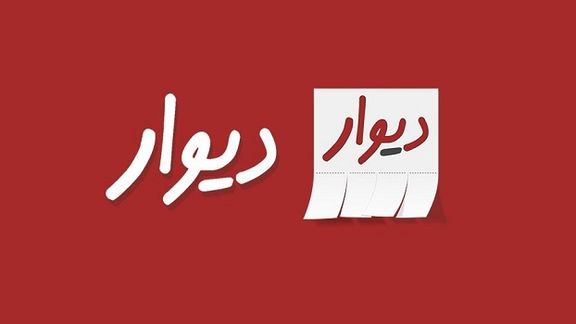
The Iran-based marketplace app, Divar, has been removed from Google Play as sanctions hit e-commerce.

The Iran-based marketplace app, Divar, has been removed from Google Play as sanctions hit e-commerce.
According to an email published by Divar, Google said the app has been removed to comply with the sanctions regime of the United States against Iran.
“Products on Google Play may be subject to United States’ and other jurisdictions’ export control and sanctions laws and regulations,” read Google’s email.
Divar had more than 10 million active users before being removed from Google Play.
The company's public relations published a statement on its website Thursday warning that the removal of its application will cause the spread of malware of the same name and will violate the rights of users.
Meanwhile, according to research, Cafe Bazaar, as one of the subsidiary companies of Hezardastan Holding that owns Divar, is one of the reasons for spreading Android malware in Iran.
Google had previously removed some other applications developed in Iran from its store. In November last year, 10 Iranian apps were removed from the Google Play store, including Divar’s business competitor “Sheipour”.
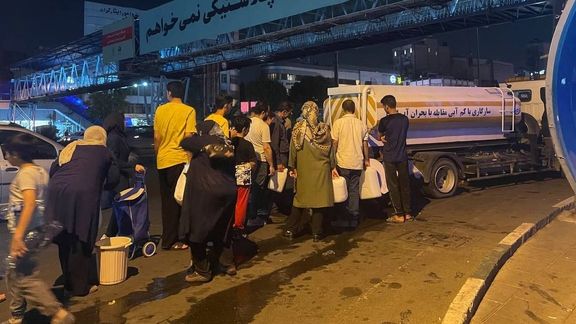
Officials including minister Ali-Akbar Mehrabian on Wednesday claimed that outage of drinking water in Tehran has completely ended but evidence indicates otherwise.
Mehrabian said that water treatment facilities have resumed operations since Tuesday evening and are working at full capacity. “We are trying to raise the water pressure back to the normal level gradually,” he said. But videos on social media showed tankers distributing water to residents on Wednesday.
Drinking water outage which started in some districts of the capital Tehran Friday has impacted not only households but also many businesses, particularly restaurants. Beside regular household use, the outage has disrupted the use of cooling systems in houses when often near 40 degrees Celsius during the day at this time of the year.
Videos sent to Iran International TV by citizens indicate that outage or low pressure has continued in some of the areas of the capital. They also say water tankers are still distributing water in various neighborhoods.
Reports from Tehran also indicate that bottled water has vanished from shelves in some areas of the capital and the price has gone up too.
The water outage started when torrential rains flooded rivers and caused extensive landslides in various areas of the country including around the capital where riverbeds were completely blocked by debris from the mountains.
Karaj, the capital of Alborz Province, which is a city of over 1.6 million only about 40 kilometers (25 miles) to the west of Tehran has also been affected by the outage.
Some citizen reports on social media indicate that the outage has continued in some areas of the city despite officials’ claims that it ended at midday Monday.
Many citizens have expressed anger on social media over lack of accountability by the water supply network officials who did not provide timely warnings to citizens and repeatedly claimed the outage would end within hours.
Water shortage has been threatening the Iranian capital of 10m for years. Causes include drought and the massive waste of water due to the dilapidation of the distribution infrastructures.
Iran has been suffering from drought for at least a decade and officials have been warning of a further decrease in precipitation. The volume of water in the five dams that supply Tehran, for instance, has consistently been going down in recent years.
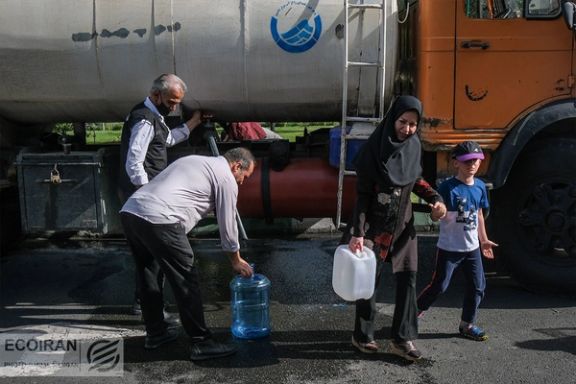
Mohammadreza Bakhtiari, the former CEO of Tehran Water and Sewerage Company, said in early April that about 20 percent of drinking water in Tehran, as much as 300,000 cubic meters, goes to waste before reaching households and businesses.
In recent years, massive protests have occurred in several cities against government mismanagement of water resources, harmful dam building, and politically motivated diversion of rivers that have devastated agriculture and drinking water sources in many areas.
In July 2021, water protests erupted in several cities in the oil-rich Khuzestan province that ended with the forceful intervention of police and the Revolutionary Guards. More than ten people were killed and hundreds detained during the protests that lasted a week.
In November of the same year, thousands protested in Esfahan over lack of water for agriculture where the iconic Zayandeh-Roud river has turned into a dry bed over the past few years. The protests soon turned into anti-government unrest.
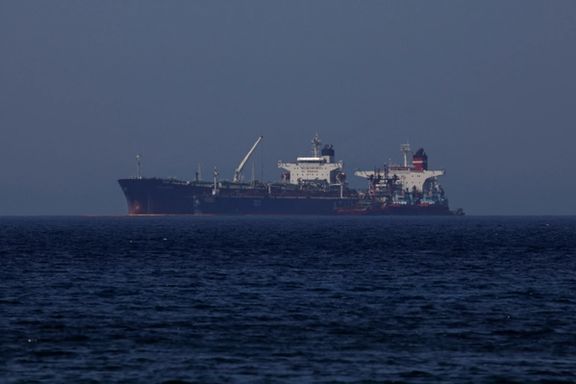
Germany's Federal Office for Economic Affairs and Export Control (BAFA) denied the import of crude oil and petroleum products from Iran.
Eurostat, the European Union's statistical office, reported on Monday that Germany has imported crude oil or petroleum products for the first time in five years from Iran.
Based on the report, Germany imported 69,737 metric tons of crude oil or petroleum products from Iran in March of this year. The country's last import of Iranian crude was 10,000 mt in October 2018.
However, BAFA told Iran International’s correspondent Ahmad Samadi on Wednesday that there was a mistake in the reporting by the Eurostat.
“The import about 70.000 tons from Iran is wrongly declared. These quantities originally come from Mexico.”
BAFA also added that Eurostat has corrected this mistake in its data.

According to the German Federal Statistical Office, the trade volume between Tehran and Berlin has decreased dramatically.
The country's exports to Iran in April 2023 have decreased by 28% compared to the last year.
According to the figures, exports to Iran in April this year decreased by over 32 million euros reaching 82,826,000 euros.
Imports from Iran in April 2023 were around 17 million euros, which has dropped by 22.6% compared to the same period last year.
German exports to Iran include chemicals, machinery, and food products, and on the other hand, Iran has exported mostly food products to Germany.
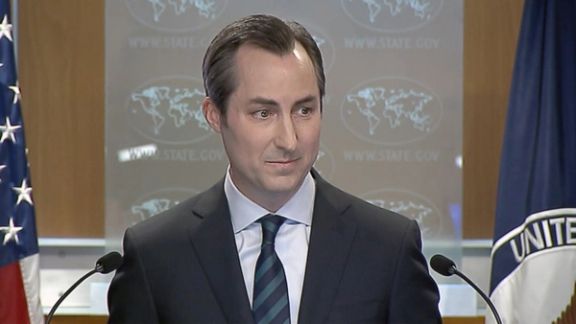
The United States has finally confirmed it allowed Iraq to release $2.7 billion of its debts to Iran.
The mechanism by which the money would be released remains murky, but Washington claims it is part of a number of humanitarian transactions which have been taking place consistently over years since the previous administration.
Speaking in this week’s press briefing, Matthew Miller, spokesperson for the US Department of State, told reporters: “Iran can only access its funds held in accounts for Iraq for humanitarian and other non-sanctionable transactions.”
He told reporters the transaction is consistent with US law and in full coordination with the Government of Iraq while all Iran-related sanctions continue to be upheld.
Iraqi Foreign Minister Fuad Hussein was reportedly given the clearance during a meeting with US Secretary of State Antony Blinken on the sidelines of the Riyadh Conference on June 8, according to Reuters.
The Iraqi foreign ministry source said that the funds will be transferred through the Commercial Bank of Iraq and Iranian officials have confirmed that the money will be used for Iranian Hajj pilgrims' expenses and foodstuffs imported by Iran.
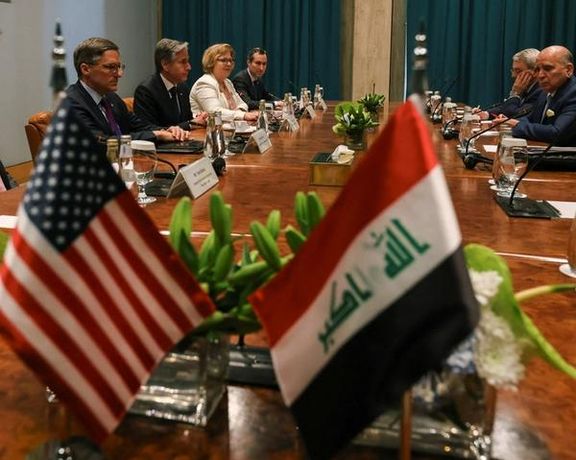
In spite of reports worldwide, the US continues to deny its being in direct talks with Iran over a return to the nuclear deal. Miller said that recent reports have been “false” or misleading, claiming the channels of communication have always been open.
As reporters' questions became more intense, Miller was increasingly uncomfortable, tripping over his words and backtracking as things heated up. A barrage of questions were thrown at the spokesman whose standard lines were clearly not cutting it in light of the Iraq revelations and the obvious frustration reporters felt by the ongoing denials of the Oman talks.
“We have always had the ability to deliver messages to Iran when it’s in the interests of the United States to do so,” he said, undermining the meeting which took place in Oman, repeating the Biden administration’s standard line that diplomacy is the best means to ensuring Iran does not obtain a nuclear weapon in spite of its having reached terrifying limits.
So seriously has the meeting and its outcome been taken by Iran’s adversaries, Israeli Prime Minister Benjamin Netanyahu addressed the matter in the Knesset Foreign Affairs and Defense Committee meeting on Tuesday.
He openly stated there is very much a deal underway between the US and Iran, reasserting claims that "no agreement with Iran will be binding on Israel, which will continue to do everything to defend itself."
Referring to Iran, he told MKs that “over 90% of our security problems stem from Iran and its proxies, and our policy is aimed at increasing the circle of peace, to stop Iran and its proxies”, no matter what deals are struck between Iran and other nations, emphasizing the government’s “opposition to a return to the original [JCPOA] agreement”.
He admitted there are still differences of outlook on the matter between Israel and its largest ally, the US, not only about JCPOA but also about smaller agreements.
The revelations come amidst a busy diplomatic week for Iran, which this week, saw its chief unclear negotiator, Ali Bagheri-Kani, meet representatives of the E3, Britain, France and Germany, in Abu Dhabi on Tuesday.
Christian Turner, Director General Geopolitics and Political Director at the UK’s Foreign and Commonwealth Office, remained tight-lipped on the nature of discussions, only tweeting: “The discussion covered a wide range of issues of mutual interest and concern.”
To have taken place in Abu Dhabi shows the importance of Tehran’s ties to its Arab Gulf neighbours and adversaries, which are taking a key role in facilitating a peaceful resolution to Iran’s ongoing nuclear armament, which, on Abu Dhabi’s doorstep, keeps its leaders awake at night.
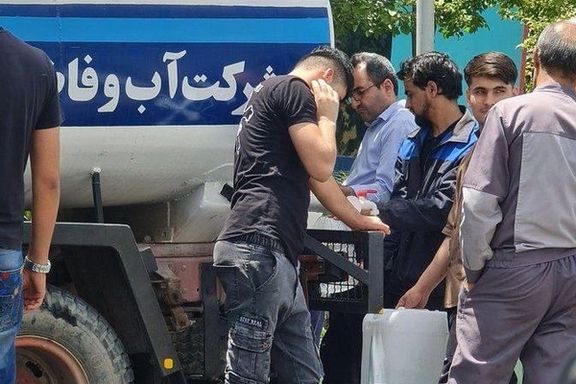
Citizens of Tehran and Karaj had drinking water cuts for the fourth day in a row this week as the situation worsens.
While the Tehran Water and Sewage Company recently promised the water issue in the capital would be solved, it spread to new neighborhoods with many communities having no access to drinking water.
According to citizens, it’s been over 72 hours since the residents of Motahari, Sattar Khan, Vanak and other neighborhoods have been complaining about frequent water cuts.
Mohammadreza Bakhtiari, the former CEO of Tehran Water and Sewerage Company has spoken out against the supply issues, claiming about one-fifth of the city's drinking water is wasted due to the worn-out water supply network.
However, in a bid to divert blame, the regime advises the population to be responsible, urging that a more frugal use of water is the way to resolve the issue.
In recent years, many cities across the country witnessed scenes of massive protests against the authorities’ mismanagement of water resources or harmful dam building and politically motivated diversion of rivers that have devastated agriculture and drinking water sources.
Iran has been suffering from drought for at least a decade and officials have been warning of a further decrease in precipitation.

A member of the French parliament claims efforts have begun to vote for designation of the Islamic Revolutionary Guard Corps.
In an exclusive interview with the Persian Service of Radio Free Europe in Prague, Radio Farda this week, Éléonore Caroit stated that so far there were technical and judicial obstacles to proscribe the IRGC, but the preparations for the motion have already been made.
A group of lawyers including seven French and Iranian solicitors, said they have concluded with legal investigations that contradict EU Foreign Policy Chief Josep Borrell's claims that there are legal obstacles to designating the IRGC as a terrorist organization.
The group is now consulting with the French parliament and government to approve and implement the resolution.
On Sunday, Éléonore Caroit participated in a protest rally in Paris to condemn Europe’s relations with the ruling regime.
The European Parliament overwhelmingly passed a resolution in January calling on the EU and member states to designate Iran’s Revolutionary Guard as a terrorist group.
The resolution demanded that Iranian authorities end the crackdown on popular protests that started last September after 22-year-old Mahsa Amini was killed in morality police custody.
It also demanded that Europe sanction the Islamic Republic’s Supreme Leader Ali Khamenei and its president Ebrahim Raisi.
"It is something that cannot be decided without a court decision first. You cannot say I consider you a terrorist because I don't like you," Josep Borrell, the EU's high representative for foreign affairs, told reporters in Brussels.